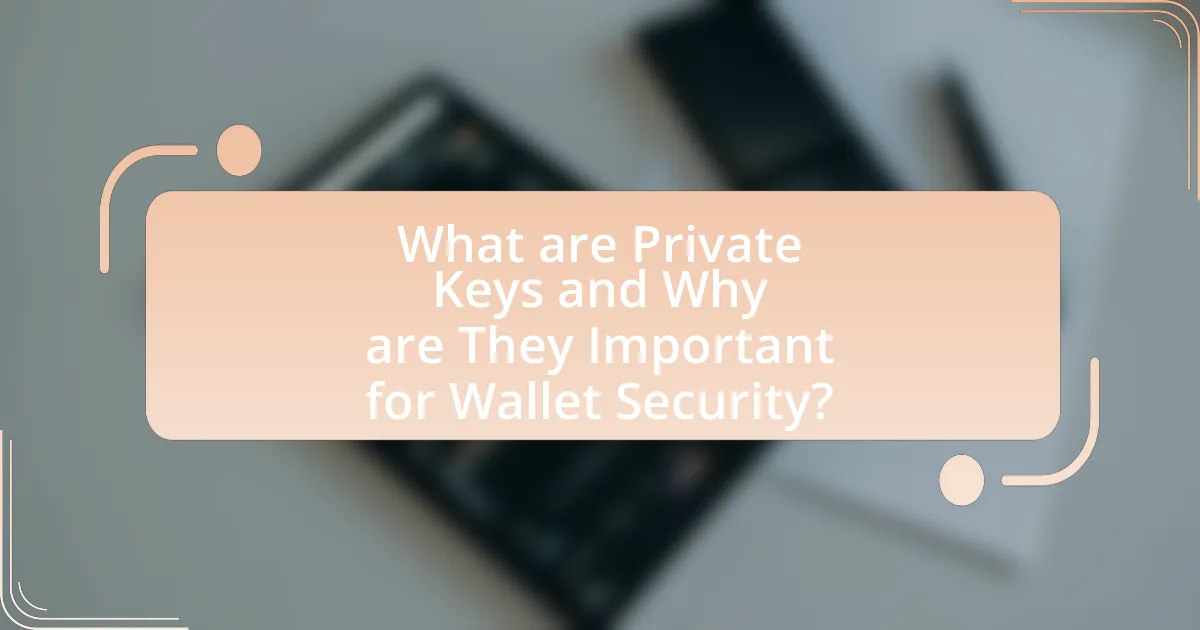Private keys are cryptographic keys essential for accessing and managing cryptocurrency wallets, serving as the sole means to sign transactions and prove ownership of digital assets. This article delves into the critical role of private keys in wallet security, explaining their function in cryptocurrency transactions, the relationship between private and public keys, and the risks associated with their loss or exposure. It also covers best practices for generating, managing, and securely storing private keys, as well as common misconceptions that can lead to significant security vulnerabilities. Understanding these aspects is vital for safeguarding digital assets and ensuring the integrity of cryptocurrency holdings.

What are Private Keys and Why are They Important for Wallet Security?
Private keys are cryptographic keys that allow users to access and manage their cryptocurrency wallets. They are essential for wallet security because they provide the means to sign transactions and prove ownership of the associated digital assets. Without the private key, a user cannot access their funds, making it a critical component of wallet security. The loss or theft of a private key can result in the irreversible loss of assets, as there is no way to recover them without the key. This highlights the importance of securely storing private keys, as they are the only way to authorize transactions and maintain control over one’s cryptocurrency holdings.
How do Private Keys function in cryptocurrency wallets?
Private keys function as the essential cryptographic keys that allow users to access and manage their cryptocurrency holdings within wallets. Each private key is a unique string of characters that corresponds to a specific public address, enabling the owner to sign transactions and prove ownership of the associated digital assets. When a transaction is initiated, the private key generates a digital signature, which is then verified by the network using the corresponding public key, ensuring that only the rightful owner can authorize the transfer of funds. This mechanism is foundational to the security of cryptocurrency transactions, as the loss or compromise of a private key results in the irreversible loss of access to the associated assets.
What is the relationship between Private Keys and Public Keys?
Private keys and public keys are cryptographic keys that work together in asymmetric encryption, where the private key is kept secret and the public key is shared openly. The private key is used to sign transactions or messages, providing proof of ownership and authenticity, while the public key is used to verify those signatures, ensuring that the transaction or message originated from the holder of the corresponding private key. This relationship enables secure communication and transactions in digital environments, as the public key can be distributed widely without compromising the security of the private key.
How do Private Keys enable transactions in blockchain technology?
Private keys enable transactions in blockchain technology by providing a secure means for users to sign and authorize transactions. Each private key is a unique cryptographic code that corresponds to a public key, allowing the owner to prove ownership of the associated digital assets. When a transaction is initiated, the private key generates a digital signature that verifies the transaction’s authenticity and integrity, ensuring that only the rightful owner can authorize the transfer of assets. This process is fundamental to the security of blockchain networks, as it prevents unauthorized access and fraud, thereby maintaining the trust and reliability of the entire system.
What risks are associated with Private Keys?
Private keys are associated with several significant risks, primarily including loss, theft, and unauthorized access. Loss occurs when users misplace their private keys, resulting in permanent inaccessibility to their cryptocurrency assets. Theft can happen through hacking, phishing attacks, or malware, where malicious actors gain access to private keys and subsequently control the associated funds. Unauthorized access may also arise from poor security practices, such as storing private keys in unsecured locations or sharing them with untrusted parties. According to a report by Chainalysis, over $3.2 billion in cryptocurrency was stolen in 2020 alone, highlighting the critical importance of safeguarding private keys to prevent financial loss.
How can losing a Private Key affect wallet access?
Losing a private key results in the permanent loss of access to the associated cryptocurrency wallet. This is because the private key is the sole means of proving ownership and authorizing transactions within that wallet. Without the private key, users cannot retrieve their funds or manage their assets, as there is no alternative method to access the wallet. According to a report by Chainalysis, approximately 20% of all Bitcoin is believed to be lost due to lost private keys, highlighting the critical importance of safeguarding these keys for wallet access.
What are the consequences of exposing a Private Key to unauthorized parties?
Exposing a Private Key to unauthorized parties results in the complete compromise of the associated cryptocurrency wallet. When a Private Key is revealed, unauthorized individuals can access, transfer, or steal all assets within that wallet. This vulnerability is evidenced by numerous incidents in the cryptocurrency space, where breaches have led to significant financial losses; for example, in 2014, the Mt. Gox exchange lost approximately 850,000 Bitcoins due to compromised Private Keys. Therefore, safeguarding Private Keys is critical to maintaining wallet security and protecting digital assets.

How are Private Keys Generated and Managed?
Private keys are generated using cryptographic algorithms, typically through methods such as random number generation or deterministic algorithms like the Elliptic Curve Digital Signature Algorithm (ECDSA). These keys are managed through secure storage solutions, including hardware wallets, software wallets, and secure backup practices. For instance, hardware wallets generate private keys offline, minimizing exposure to online threats, while software wallets may use encryption to protect keys stored on devices. The security of private keys is critical, as losing them results in the loss of access to associated cryptocurrency assets.
What methods are used to generate Private Keys?
Private keys are generated using several methods, including deterministic algorithms, random number generation, and cryptographic key derivation functions. Deterministic algorithms, such as the Elliptic Curve Digital Signature Algorithm (ECDSA), produce private keys based on a fixed input, ensuring reproducibility. Random number generation relies on secure random number generators to create unpredictable keys, which is crucial for security. Cryptographic key derivation functions, like PBKDF2 or Argon2, derive private keys from a password or passphrase, adding an additional layer of security through hashing and salting. These methods are validated by their widespread use in secure systems, ensuring the integrity and confidentiality of private keys in digital wallets.
How does randomness play a role in Private Key generation?
Randomness is crucial in private key generation as it ensures the uniqueness and unpredictability of the keys. Private keys are typically generated using random number generators that produce values which are difficult to predict. This unpredictability is essential because if private keys were predictable, they could be easily compromised, leading to unauthorized access to digital wallets. For instance, the National Institute of Standards and Technology (NIST) emphasizes the importance of using high-quality randomness in cryptographic applications to prevent vulnerabilities. Thus, effective randomness directly contributes to the security and integrity of private keys in digital transactions.
What are the differences between deterministic and non-deterministic key generation?
Deterministic key generation produces keys from a fixed algorithm and a specific input, such as a seed, ensuring that the same input will always yield the same key. In contrast, non-deterministic key generation relies on random processes, meaning that the keys generated are unique and cannot be reproduced from the same initial conditions. This distinction is crucial in cryptography; deterministic methods are often used in scenarios requiring reproducibility, while non-deterministic methods enhance security by providing greater unpredictability. For example, the use of a pseudorandom number generator in non-deterministic key generation can create keys that are less susceptible to attacks compared to deterministic methods, which may be vulnerable if the seed is compromised.
How can users securely manage their Private Keys?
Users can securely manage their private keys by utilizing hardware wallets, which store keys offline and are less susceptible to hacking. Hardware wallets, such as Ledger and Trezor, provide a secure environment for key storage, ensuring that private keys never leave the device. Additionally, users should implement strong passwords and enable two-factor authentication on their wallets to add an extra layer of security. Regularly updating wallet software and being cautious of phishing attempts further enhances protection. According to a report by the Cybersecurity & Infrastructure Security Agency, hardware wallets significantly reduce the risk of unauthorized access compared to software wallets.
What are the best practices for storing Private Keys?
The best practices for storing private keys include using hardware wallets, employing strong encryption, and implementing multi-signature setups. Hardware wallets, such as Ledger or Trezor, provide a secure offline environment for private keys, significantly reducing the risk of online attacks. Strong encryption ensures that even if the storage medium is compromised, the private keys remain protected. Multi-signature setups require multiple keys to authorize a transaction, adding an additional layer of security. According to a report by the Blockchain Security Alliance, utilizing these methods can reduce the likelihood of key theft and unauthorized access by over 90%.
How can hardware wallets enhance Private Key security?
Hardware wallets enhance Private Key security by storing the keys offline, which significantly reduces the risk of unauthorized access and hacking. Unlike software wallets that are connected to the internet and vulnerable to malware and phishing attacks, hardware wallets keep the Private Keys in a secure, isolated environment. This isolation ensures that even if a computer is compromised, the Private Keys remain protected. Additionally, hardware wallets often incorporate advanced security features such as encryption, secure chip technology, and multi-factor authentication, further safeguarding the keys from theft. The effectiveness of hardware wallets is evidenced by their widespread adoption among cryptocurrency users, with many experts recommending them as the most secure option for managing digital assets.

What are the Common Misconceptions about Private Keys?
Common misconceptions about private keys include the belief that they are stored on the blockchain, that they can be recovered if lost, and that they are the same as public keys. Private keys are not stored on the blockchain; they are generated and held by the user, making them essential for accessing cryptocurrency wallets. If a private key is lost, it cannot be recovered, leading to permanent loss of access to the associated funds. Additionally, private keys are distinct from public keys; the former is used for signing transactions, while the latter is used for receiving funds. These misconceptions can lead to significant security risks and financial losses for users.
Why do some people believe Private Keys are unnecessary?
Some people believe private keys are unnecessary because they trust third-party services to manage their cryptocurrency assets. This reliance on centralized exchanges or wallets leads individuals to feel that they do not need to handle private keys themselves, as these services often provide user-friendly interfaces and security measures. Additionally, the perception that these platforms can offer adequate protection against theft or loss contributes to the belief that private keys are redundant. However, this trust can be misplaced, as centralized services have been subject to hacks and failures, highlighting the importance of private keys in ensuring true ownership and control over digital assets.
What are the implications of misunderstanding the role of Private Keys?
Misunderstanding the role of Private Keys can lead to severe security vulnerabilities, including loss of funds and unauthorized access to digital assets. Private Keys are essential for controlling cryptocurrency wallets; if users fail to grasp their importance, they may expose themselves to phishing attacks or inadvertently share their keys, resulting in theft. For instance, a 2021 report by Chainalysis indicated that over $7.7 billion in cryptocurrency was stolen, often due to users mishandling their Private Keys. This highlights the critical need for proper education on Private Key management to ensure the security of digital assets.
How does the security of Private Keys impact overall wallet security?
The security of private keys directly impacts overall wallet security by determining the vulnerability of the assets stored within the wallet. If private keys are compromised, unauthorized access to the wallet occurs, leading to potential theft of cryptocurrencies or sensitive information. For instance, a study by Chainalysis in 2021 revealed that 72% of cryptocurrency thefts were due to compromised private keys, highlighting their critical role in safeguarding digital assets. Therefore, robust security measures for private keys, such as hardware wallets or multi-signature setups, are essential to ensure the integrity and safety of the entire wallet system.
What measures can be taken to improve wallet security through Private Key management?
To improve wallet security through Private Key management, users should implement measures such as using hardware wallets, enabling two-factor authentication, and regularly updating software. Hardware wallets store private keys offline, significantly reducing the risk of online attacks, as evidenced by the fact that hardware wallets are considered one of the most secure methods for key storage. Enabling two-factor authentication adds an additional layer of security, making unauthorized access more difficult. Regularly updating wallet software ensures that users benefit from the latest security patches and features, which is crucial given that vulnerabilities can be exploited if software is outdated.
What practical tips can users follow to protect their Private Keys?
To protect private keys, users should employ several practical strategies. First, users must store private keys offline in a secure hardware wallet, which significantly reduces the risk of online hacking. Additionally, users should enable two-factor authentication (2FA) on any accounts associated with their private keys, adding an extra layer of security against unauthorized access. Furthermore, users should regularly back up their private keys in multiple secure locations, ensuring that they can recover their assets in case of loss or damage. Lastly, users must avoid sharing their private keys with anyone and be cautious of phishing attempts, as these can lead to unauthorized access and theft of funds. These practices are essential for maintaining the security of private keys and safeguarding digital assets.